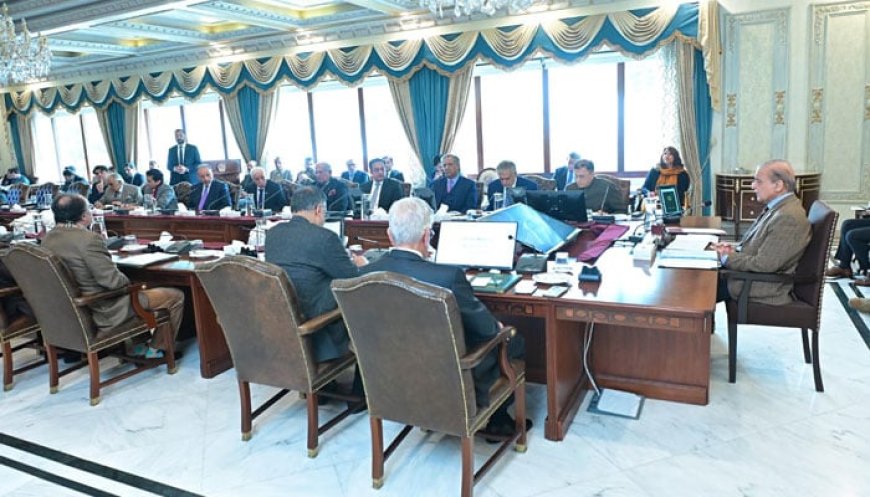PM says economy poised for take-off as inflation cools to seven-year low

1. Premier underscores need for export-led growth to secure economic development
ISLAMABAD: On Wednesday, Prime Minister Shehbaz Sharif expressed satisfaction with the country's macroeconomic stability and emphasized the importance of moving toward growth.
During a federal cabinet meeting, he stated, “We need to focus on the export sector as it is crucial for our economic development.”
Shehbaz acknowledged that revenue receipts had reached high levels compared to the last 25 years, though a significant gap remained when compared to the revenue targets set under the IMF agreement.
He stressed the need for export-led growth to ensure economic progress and called on the Federal Board of Revenue (FBR) to enforce measures to meet the IMF's revenue targets.
“Enforcement is crucial to our success,” he said, expressing confidence that the targets would be met and the gap closed, thanks to the FBR's progress over the last nine months.
He commended Deputy Prime Minister Ishaq Dar, Finance Minister Muhammad Aurangzeb, and the State Bank Governor for their efforts, which resulted in Rs72 billion in revenue from Advance Deposit Receipts (ADR).
The prime minister highlighted that 97% of the IMF's revenue target had already been achieved, with the FBR chairman's efforts playing a significant role.
Shehbaz also introduced “Uraan Pakistan,” a five-year economic plan, expressing hope that it would be a positive development for the New Year. He stressed the need for diligence and perseverance in achieving its targets and praised the ministries involved in the plan's preparation.
On foreign remittances, the prime minister noted that they had reached $15 billion in the first five months of the current fiscal year, expressing confidence that they could reach $35 billion by the end of the fiscal year.
He added that the government was focusing on rightsizing and downsizing and would encourage progress in e-governance within ministries.
Regarding the Faceless Customs Assessment System trial run at the Karachi Port, Shehbaz highlighted its positive impact on the business community, reducing container inspection time by 39%. He also praised the army chief for helping eliminate sugar smuggling to Afghanistan.
The prime minister noted these successes despite challenges such as political protests. He mentioned the establishment of a world-class airport in Gwadar, with China's support, which would help transform the region into a commercial hub.
Shehbaz also paid tribute to security personnel for their sacrifices in the fight against terrorism, recalling that the release of numerous terrorists in 2021 had led to a resurgence of terrorism.
Deputy Prime Minister and Foreign Minister Ishaq Dar informed the cabinet that Pakistan had begun its term as a non-permanent member of the UN Security Council for 2025-2026. The cabinet praised this diplomatic achievement. The prime minister also sought details on public sector imports via Gwadar Port for the last three months.
The cabinet approved new rules for appointing Information Group officers in Pakistani missions abroad to ensure transparency and merit. It also approved the registration of Liaquat University of Medical and Health Sciences in Thatta.
Meanwhile, inflation in Pakistan saw a significant drop, falling to 4.07% in December 2024 from 4.86% in November, and a substantial decrease from 29.66% in December 2023. This marked the lowest inflation rate in nearly seven years and the fifth consecutive month of single-digit inflation.
The first half of FY2024-25 (July-December) saw average inflation decrease to 7.22%, compared to 28.79% during the same period last year, according to the Pakistan Bureau of Statistics (PBS).
Economists attributed the drop to stable commodity markets, improved supply chains, and a relatively stable rupee, along with a “base effect” from last year's high inflation. The December inflation rate was the lowest since April 2018.
Core inflation, excluding food and energy prices, fell to 8.1% in December, down from 8.9% in November and a sharp decrease from 18.2% in December 2023.
Urban inflation decreased to 4.4%, while rural inflation fell to 3.6%, reflecting broad-based easing in price pressures.
Despite the drop in inflation, Pakistan's real interest rates remain high. With the State Bank's policy rate at 13% and inflation at 4.07%, the real interest rate is 8.93 percentage points, a level that could strain debt sustainability and hinder growth.
Analysts are calling for an interest rate cut, arguing that prolonged high rates could stifle economic recovery and worsen fiscal pressures, as debt servicing already consumes over 75% of government revenues. Lower rates would stimulate economic activity and ease the burden on public finances.
The International Monetary Fund (IMF) forecasts Pakistan's inflation to average 9.2% for the fiscal year, much lower than the 23.4% recorded in FY2024. While this outlook suggests further easing, economists caution that global energy price shocks and currency fluctuations could reignite inflationary pressures.
A significant decline in food inflation was a key factor in the drop, with food prices rising by just 0.27% year-on-year in December. However, some food items, including potatoes, fresh fruits, vegetable ghee, and cooking oil, saw month-on-month price increases.
The Wholesale Price Index (WPI) fell to a 50-month low of 1.93% in December, down from 2.3% in November and a sharp decline from 27.33% in December 2023. This suggests that retail inflation may continue to stabilize in the coming months, as wholesale prices typically influence consumer prices.
Among non-food items, solid fuels, household textiles, and woolen garments saw price hikes, while electricity charges fell by 5.7%, and transportation costs declined slightly, offering some relief to consumers.


















































